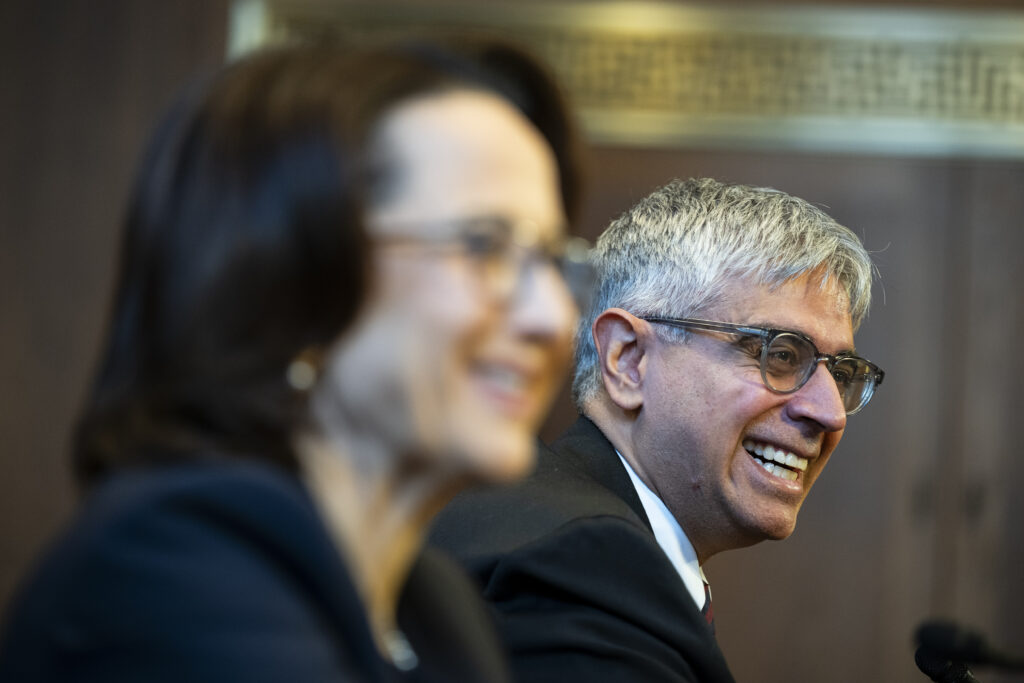
Adeel Mangi, the first Muslim nominated for a federal appellate court judgeship, withdrew his nomination for the U.S. Court of Appeals for the 3rd Circuit in a fiery letter to President Joe Biden on Monday, accusing senators of engaging in a smear campaign that tanked his chances.
“This is no longer a system for evaluating fitness for judicial office,” Mangi wrote, describing the judicial confirmation process as driven by “performative McCarthyism” and “dark-money-funded attacks that especially target minorities.”

Mangi, a New York lawyer with a multifaceted legal career, was nominated to the Philadelphia-based U.S. Court of Appeals for the 3rd Circuit in 2023. However, his confirmation faced fierce opposition from Republicans, who questioned his stance on Israel, Hamas, and the 9/11 terrorist attacks. Mangi, in his four-page letter, decried the line of questioning as rooted in anti-Muslim bias, asserting that he was presumed guilty of extremist sympathies simply because of his faith.
“Instead of being asked about my qualifications or legal philosophy, I was asked whether I supported Hamas and if I celebrated the anniversary of 9/11,” Mangi said. “The underlying premise appeared to be that because I am Muslim, surely I support terrorism.”
New Jersey Attorney General Matt Platkin posted to X that Mangi “deserved better,” saying the opposition to him was “disgraceful” and that his confirmation “would have meant a more representative judiciary.”
Meanwhile, longtime critics of Mangi, such as Carrie Severino, president of the conservative group formerly known as the Judicial Crisis Network, now JCN, pushed back on Mangi’s own claim that “Islamophobia” contributed to his withdrawal.
“Adeel Mangi’s judicial nomination was defeated because he had ties to a radical, antisemitic group that blamed the United States for 9/11 and taught students to hate Israel and our country,” Severino said. “And then he misled the Senate Judiciary Committee about it.”
Democrats became wary of Mangi’s prospects
While Mangi’s nomination faced a Republican attack fueled by Republican Senate Judiciary Committee members and Senate Minority Leader Mitch McConnell (R-KY), it was Democratic defections that sealed his fate.
Sens. Catherine Cortez Masto (D-NV) and Jacky Rosen (D-NV) voiced concerns about Mangi’s advisory role with the Alliance of Families for Justice, a nonprofit organization linked to advocacy for people accused of killing police officers. Mangi contended that his involvement was minimal and centered on pro bono civil rights work.
Sen. Joe Manchin (I-WV), known for opposing partisan nominees, also withheld his support. Without unanimous Democratic backing, Mangi lacked the votes needed for confirmation.
The GOP concerns that became too big to ignore
Mangi’s nomination became a flashpoint in the broader political fight over judicial appointments. Senate Republicans seized on his ties to the Rutgers Center for Security, Race, and Rights, a think tank criticized for hosting controversial figures and events. The center had previously faced scrutiny for alleged anti-Israel sentiment, which Republican lawmakers cited in their criticisms of Mangi.
McConnell accused Mangi of associating with “terrorist apologists and advocates for cop-killers,” a claim Mangi called baseless. Even though prominent Jewish organizations and law enforcement groups endorsed Mangi, the attacks gained traction, amplified by the Washington Examiner’s reporting on Mangi’s ties to Rutgers.
Despite Mangi’s letter to the president condemning the events that led to his withdrawal, he apologized in March after acknowledging he failed to fully divulge his involvement with an advisory board at Rutgers that hosted a 2021 event featuring a convicted terrorist fundraiser.
“I do not have any notes, transcript, or recording of this panel discussion,” Mangi wrote in a separate letter at the time. “I apologize for the inadvertent omission of this event, and I appreciate the Senate’s ongoing consideration of my nomination.”
Judicial nomination deal
Mangi’s withdrawal follows a deal struck between Senate Democrats and Republicans to forgo further circuit court confirmations for the remainder of the year. In exchange, Republicans agreed to expedite votes on district court nominees, allowing Biden a chance to surpass former President Donald Trump’s judicial appointment record.
CLICK HERE TO READ MORE FROM THE WASHINGTON EXAMINER
In his letter, Mangi lamented the Senate’s failure to provide him with a floor vote, describing the ordeal as a “prolonged and astonishing process.” Despite his withdrawal, he reaffirmed his commitment to his faith and identity.
“I entered this nomination process as a proud American and a proud Muslim,” he wrote. “I exit it the same way, unbowed.”







